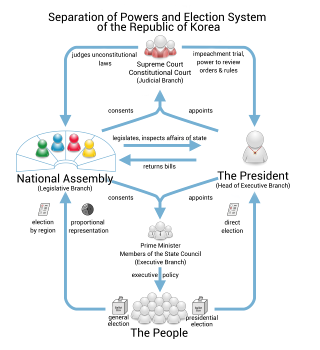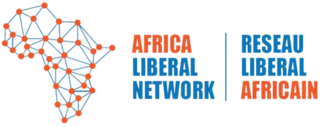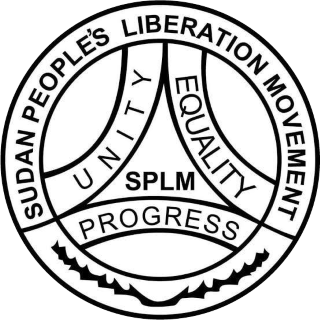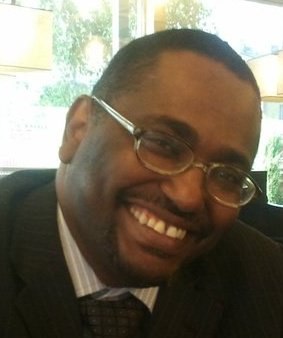 |
|---|
| Constitution |
This article lists political parties in South Sudan .
 |
|---|
| Constitution |
This article lists political parties in South Sudan .
| Party | Abbr. | CoS seats | Legislative Assembly seats | |
|---|---|---|---|---|
| Sudan People's Liberation Movement | SPLM | 46 / 100 | 332 / 550 | |
| Sudan People's Liberation Movement-in-Opposition | SPLM-IO | 27 / 100 | 128 / 550 | |
| South Sudan Opposition Alliance | SSOA | 10 / 100 | 50 / 550 | |
| Democratic Forum | 2 / 100 | |||
| United South Sudan African Party | USSAP | 2 / 100 | ||
| Labour Party | LPSS | 1 / 100 | ||
| Democratic Change | DC | 1 / 100 | ||
| United South Sudan Party | USSP | 1 / 100 | ||
| Sudan African National Union | SANU | 1 / 100 | ||
| United Democratic Salvation Front | USDF | 1 / 100 | ||

The politics of South Korea take place in the framework of a presidential representative democratic republic, whereby the president is the head of state, and of a multi-party system. To ensure a separation of powers, the Republic of Korea Government is made up of three branches: legislative, executive, and judicial. The government exercises executive power and legislative power is vested in both the government and the National Assembly. The judiciary is independent of the executive and the legislature and comprises a Supreme Court, appellate courts, and a Constitutional Court.
Liberal Democrats may refer to:
Social conservatism is a political philosophy and a variety of conservatism which places emphasis on traditional power structures over social pluralism. Social conservatives organize in favor of duty, traditional values and social institutions, such as traditional family structures, gender roles, sexual relations, national patriotism, and religious traditions. Social conservatism is usually skeptical of social change, instead tending to support the status quo concerning social issues.

The Democratic Alliance is a South African political party and the official opposition to the ruling African National Congress (ANC). The party is broadly centrist, and has been attributed both centre-left and centre-right policies. It is a member of Liberal International and the Africa Liberal Network. The DA traces its roots to the founding of the anti-apartheid Progressive Party in 1959, with many mergers and name changes between that time and the present. The DA ideologically shows a variety of liberal tendencies, including social liberalism, classical liberalism, and conservative liberalism.
A dominant-party system, or one-party dominant system, is a political occurrence in which a single political party continuously dominates election results over running opposition groups or parties. Any ruling party staying in power for more than one consecutive term may be considered a dominant party. Some dominant parties were called the natural governing party, given their length of time in power.
This article gives information on liberalism worldwide. It is an overview of parties that adhere to some form of liberalism and is therefore a list of liberal parties around the world.
Liberalism in South Africa has encompassed various traditions and parties.
A big tent party, or catch-all party, is a term used in reference to a political party having members covering a broad spectrum of beliefs. This is in contrast to other kinds of parties, which defend a determined ideology, seek voters who adhere to that ideology, and attempt to convince people towards it.

The Africa Liberal Network is an organization composed of 47 political parties from 29 countries in Africa. It is an associated organisation of Liberal International, the political family to which liberal democratic parties belong. The ALN serves to promote liberal objectives and principles throughout the continent.

The Sudan People's Liberation Movement is a political party in South Sudan. It was initially founded as the political wing of the Sudan People's Liberation Army in 1983. On January 9, 2005 the SPLA, the SPLM and the Government of Sudan signed the Comprehensive Peace Agreement, ending the civil war. SPLM then obtained representation in the Government of Sudan, and was the main constituent of the Government of the then semi-autonomous Southern Sudan. When South Sudan became a sovereign state on 9 July 2011, SPLM became the ruling party of the new republic. SPLM branches in Sudan separated themselves from SPLM, forming the Sudan People's Liberation Movement–North. Further factionalism appeared as a result of the 2013–2014 South Sudanese Civil War, with President Salva Kiir leading the SPLM-Juba and former Vice President Riek Machar leading the Sudan People's Liberation Movement-in-Opposition.

The individual member states of the African Union (AU) coordinate foreign policy through this agency, in addition to conducting their own international relations on a state-by-state basis. The AU represents the interests of African peoples at large in intergovernmental organizations (IGO's); for instance, it is a permanent observer at the United Nations' General Assembly.

The National Assembly is the lower house of the National Legislature of Sudan. The Legislature was unicameral until 2005. The upper house is the Council of States.

American political ideologies conventionally align with the left–right political spectrum, with most Americans identifying as conservative, liberal, or moderate. Contemporary American conservatism includes social conservatism, classical liberalism and economic liberalism. The former ideology developed as a response to communism and the civil rights movement, while the latter two ideologies developed as a response to the New Deal. Contemporary American liberalism includes progressivism, welfare capitalism and social liberalism, developing during the Progressive Era and the Great Depression. Besides modern conservatism and liberalism, the United States has a notable libertarian movement, developing during the mid-20th century as a revival of classical liberalism. Historical political movements in the United States have been shaped by ideologies as varied as republicanism, populism, separatism, fascism, socialism, monarchism, and nationalism.
Conservatism in South Korea is a political and social philosophy characterized by Korean culture and from Confucianism. South Korean conservative parties largely believe in stances such as a developmental state, pro-business, opposition to trade unions, strong national defense, anti-communism, pro-communitarianism, pro-United States and pro-European in foreign relations, pay attention on North Korean defectors, sanctions and human rights, and recently free trade, economic liberalism, and neoliberalism.

The Liberal Party is a social liberal political party in Sudan.

Adil Abdel Aati is a Sudanese political and public figure who was the leader of Liberal Party of Sudan and CEO of the Harambi Foundation. In January 2017, Abdel Aati established Sudan of the Future, a cross party political movement and declared his intention to run in the next Sudanese Presidential election.